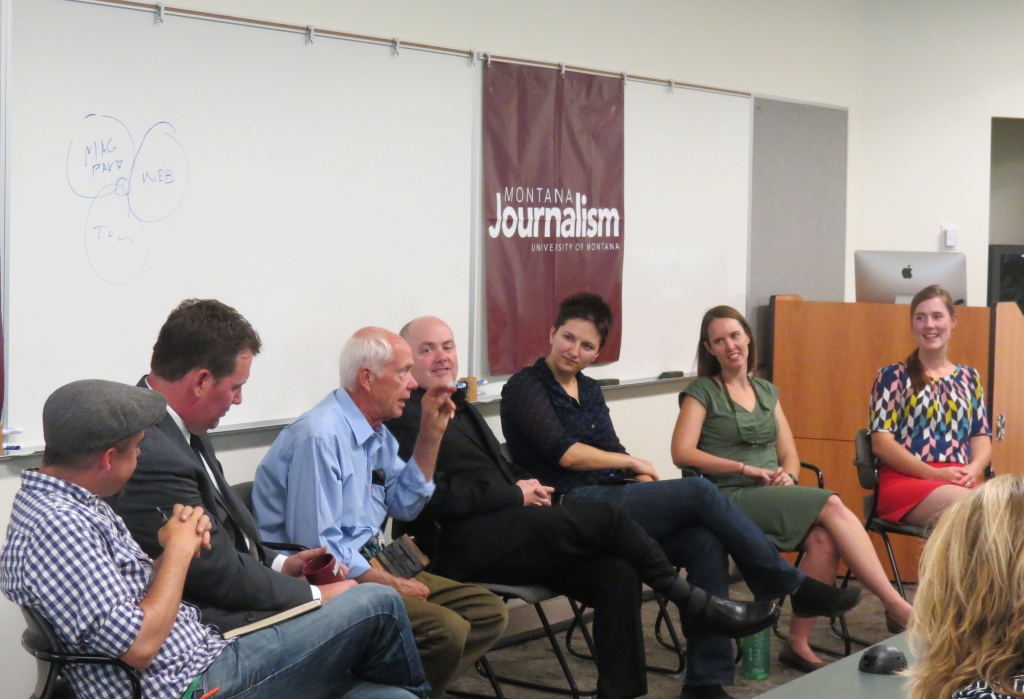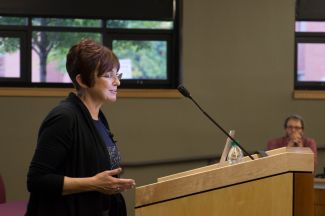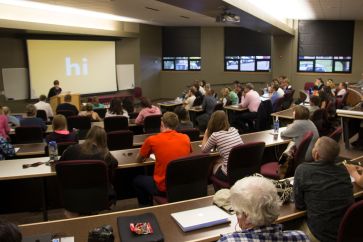University of Montana School of Journalism students heard advice from different generations of alums during homecoming.

Photos and story by Alyssa Rabil
University of Montana School of Journalism students heard advice from different generations of alums during homecoming.

Photos and story by Alyssa Rabil
Journalism school students and others received a crash course in how to run a photography business, when Judy Herrmann, past president of the trade association American Society of Media Photographers (ASMP), spoke to a large crowd Wednesday evening.

Although with a show of hands the vast majority of the audience identified themselves as aspiring photojournalists, that didn’t stop Herrmann from starting her talk with a dose of industry reality. “As much as all of you that raised your hand for photojournalism are thinking ‘I’m getting a staff job,’ you’re probably not,” she said.
Given the changing nature of the business, with staff jobs disappearing but opportunities for self employment increasing, Herrmann said it’s likely most people in the audience will at some point start their own photography business. She then proceeded to give a highly practical, nuts and bolts seminar on how to do so.
She began at the first step and covered most aspects of running a freelance businesses. Throughout her talk, Herrmann emphasized the benefits of speaking with and hiring professionals for business advice, from accountants to lawyers. “Photographers are not lawyers,” she said, “as much as some of them would like to think they are.”

Herrmann, who has won numerous awards for her own business, Herrmann + Starke, brought years of experience to the topic. She is aware of the hidden pitfalls that await freelancers starting out; bad contracts, unforeseen disasters like equipment theft (for which she recommends a careful choice in insurance), and losing control and copyright of your own work.
Erik Petersen, an adjunct photojournalism professor and long time freelancer, weighed in on her advice. “The material she covered,” he said, “is essential to anyone wanting to run a successful freelance photography business.”
At the core of her message was the importance of being a professional. By conveying professionalism at the beginning of a client relationship a freelancer ensures they’ll receive professionalism, and a fair deal, in return, Herrmann said.
By Andrew Graham
The year is off to a fantastic start here at the UM J-School. The smoke from the summer fires has cleared, and we’re enjoying blue skies and cool fall weather. Our students and faculty are hard at work already.
Our student produced show, “Business: Made in Montana,” will air Oct. 22 at 7:30 p.m. on MontanaPBS. The Kaimin, our school newspaper, is moving more content online, while the printed edition has become a full-color weekly publication. The Montana Journalism Review is off to a strong start with a new staff, and a wealth of new stories to produce.
This year’s Pollner professor is Kevin Van Valkenburg. He is a distinguished reporter and known for his work with the Baltimore Sun, ESPN.com and ESPN the Magazine. He will present a talk titled “The Art of Storytelling Will Always Be What Matters, Not the Medium.” The annual lecture will take place Oct. 19th at 7:00 p.m. and, as always, the event is free and open to the public.
As we move forward into the new school year, we invite you to celebrate with us. The festivities begin this homecoming weekend.
Join us for our alumni showcase and J-School reception. The showcase is Friday, September 25 at 2 p.m. in Don Anderson Hall, room 210. As usual, we are inviting some of our recent grads to tell us stories of their experiences in the nation’s newsrooms. This is a great chance to see how our students are adapting to the changes in our ever-evolving industry. As we move into the digital age, our students must learn new skills and we must modify our idea of traditional media. We teach our students to maintain the same level of integrity and ethical conduct as we have taught our alums for the past 100 years.
We hope to see you after the showcase. Join us for a reception in the A.B. Guthrie Library (3 – 4 p.m.). We look forward to sharing a libation, catching up on your news, and talking football.
--UM J-School Dean Larry Abramson